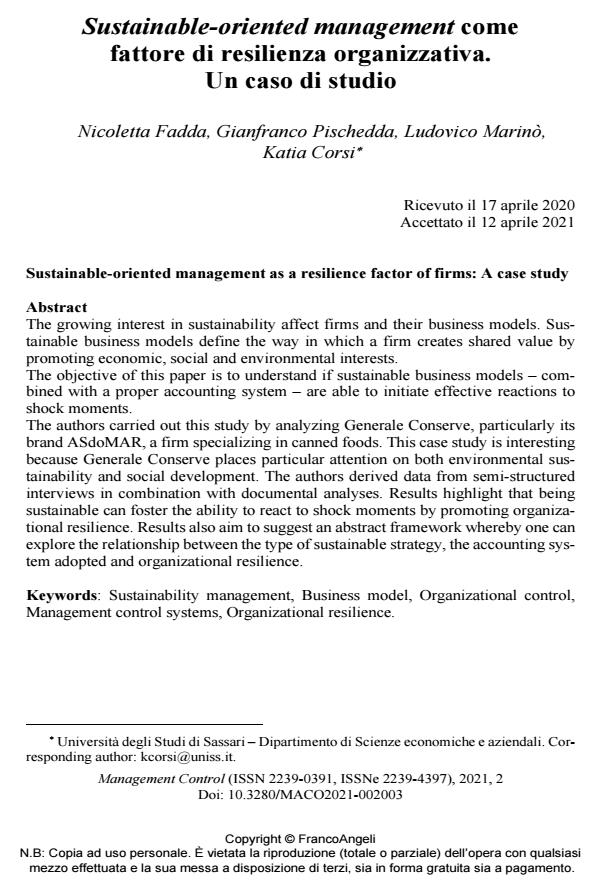Sustainable-oriented management as a resilience factor of firms: A case study
Journal title MANAGEMENT CONTROL
Author/s Nicoletta Fadda, Gianfranco Pischedda, Ludovico Marinò, katia Corsi
Publishing Year 2021 Issue 2021/2
Language Italian Pages 22 P. 39-60 File size 328 KB
DOI 10.3280/MACO2021-002003
DOI is like a bar code for intellectual property: to have more infomation
click here
Below, you can see the article first page
If you want to buy this article in PDF format, you can do it, following the instructions to buy download credits

FrancoAngeli is member of Publishers International Linking Association, Inc (PILA), a not-for-profit association which run the CrossRef service enabling links to and from online scholarly content.
The growing interest in sustainability affect firms and their business models. Sus-tainable business models define the way in which a firm creates shared value by promoting economic, social and environmental interests. The objective of this paper is to understand if sustainable business models - com-bined with a proper accounting system - are able to initiate effective reactions to shock moments. The authors carried out this study by analyzing Generale Conserve, particularly its brand ASdoMAR, a firm specializing in canned foods. This case study is interest-ing because Generale Conserve places particular attention on both environmental sustainability and social development. The authors derived data from semi-structured interviews in combination with documental analyses. Results highlight that being sustainable can foster the ability to react to shock moments by promot-ing organizational resilience. Results also aim to suggest an abstract framework whereby one can explore the relationship between the type of sustainable strategy, the accounting system adopted and organizational resilience.
Keywords: Sustainability management, Business model, Organizational control, Management control systems, Organizational resilience.
- New Metropolitan Perspectives Cristina Coscia, Angioletta Voghera, pp.1091 (ISBN:978-3-031-06824-9)
- Integrated Reporting come sistema manageriale per raggiungere obiettivi di sviluppo sostenibile: una verifica empirica Riccardo Santoni, in MANAGEMENT CONTROL 1/2023 pp.43
DOI: 10.3280/MACO2023-001003 - Environmental, Social, Governance (ESG) Domenica Lavorato, Palmira Piedepalumbo, Rita Lamboglia, pp.621 (ISBN:978-3-031-76617-6)
- "Radicare" la sostenibilità nella strategia attraverso i sistemi di management control: un caso di studio relativo ad una Pmi Armando Della Porta, Francesco De Luca, Chiara Aufiero, in MANAGEMENT CONTROL 2/2023 pp.43
DOI: 10.3280/MACO2023-002003 - Sustainable Business Model and the Firm Age Variable Impact: Evidence from wine industry Simona Alfiero, Laura Broccardo, Massimo Cane, in MANAGEMENT CONTROL 3/2024 pp.165
DOI: 10.3280/MACO2023-003008 - Resilience in action: The bottom up! architecture festival in Turin (Italy) Cristina Coscia, Angioletta Voghera, in Journal of Safety Science and Resilience /2023 pp.174
DOI: 10.1016/j.jnlssr.2022.10.005
Nicoletta Fadda, Gianfranco Pischedda, Ludovico Marinò, katia Corsi, Sustainable-oriented management come fattore di resilienza organizzativa. Un caso di studio in "MANAGEMENT CONTROL" 2/2021, pp 39-60, DOI: 10.3280/MACO2021-002003